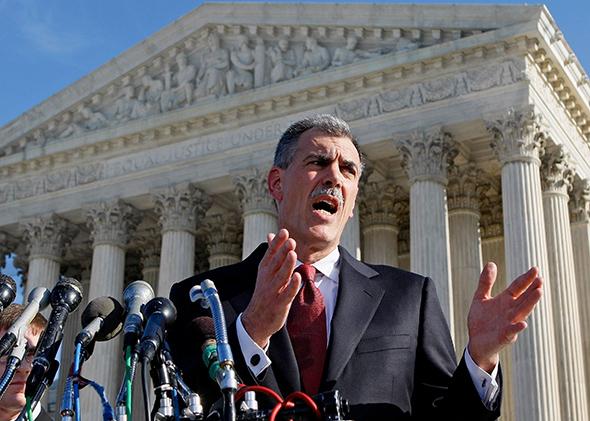The most important thing about Thursday’s ruling in King v. Burwell, of course, is that critically important health insurance subsidies are saved for more than 6 million Americans. And that, in turn, will save the functioning of the health insurance market in states across the country. But I have a more parochial observation: This may be the greatest Supreme Court term any solicitor general has ever had.
Before the government’s briefing was submitted to the court, the legal community generally thought it would be an uphill battle to save the Affordable Care Act in states with a federally managed exchange. The solicitor general’s brief changed that expectation because of the power of its arguments. Solicitor General Donald Verrilli’s oral argument rebutted every point raised by those seeking a crabbed reading of the law. I have rarely seen an opinion of the court that more closely followed the government’s arguments.
Last week, the solicitor general won Zivotofsky v. Kerry, upholding a broad interpretation of the president’s authority over foreign affairs. And Verrilli also argued and won the important case on racial redistricting, Alabama Legislative Black Caucus v. Alabama.
Add to that the victory for the government in preserving, in housing discrimination litigation, some role for disparate impact on racial minorities, and you have yet another uphill victory. Finally, if the court rules in favor of a national right to gay marriage, the solicitor general’s great term will be complete. Many advocates played a role in that case, and Verrilli’s outstanding argument was certainly one of those.
This is shaping up as one of the happiest Supreme Court final weeks a president has ever had. He should be pleased with his Justice Department.
Later, I’ll write about Justice Antonin Scalia’s dissenting opinion, joined by Justices Clarence Thomas and Samuel Alito, in King and how it treats law as a capricious game. But for now, I just want to be happy about the fact that the law is not always an ass and sometimes the best argument wins.
Read the previous entry, by Dahlia Lithwick | Read the next entry, by Mark Joseph Stern.
